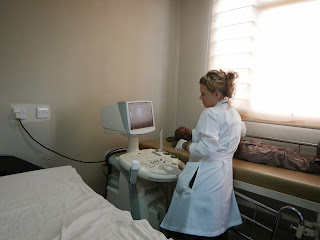This will be my last post for this trip. Thursday I went to the seizure clinic. This is part of Kathy Bowler's outreach to special needs kids and adults. About 1 out of every 100 Malawians has seizures - cerebral malaria, meningitis, and birth injuries lead the causitive list. Medications are hard to get, as the health centers and even district hospitals often have no medications or they don't have the same medications month to month. If you are familiar with seizures, you will know that randomly switching medications can be bad! In this country of open cooking fires, most of the seizure patients have fallen into fires / coals on multiple occasions. Families often sleep together. If you have seizures at night, and are incontinent (as is the usual case) and wet all over, the entire family has to get up, get cleaned up, etc. If this happens 3-4 times a night, the whole family is exhausted. If you are school age and have a seizure in school, you can be removed from school for being disruptive. Seizures here can be an all-consuming problem.
Kathy works to procure the same medications, month after month. The clinic meets every other week on a Thursday afternoon. They really need weekly or even an entire day, but there must be a doctor to prescribe the medications and Dr. Young is the only reliable doctor. Kathy says that since July, she has had 68 new patients come to the clinic. That number will likely increase. For any doctors interested, I think it would take 3-4 visits to the clinic to really get 'up to speed' on what they do, how they decide on meds, follow up, etc. Although I saw a few patients for them last Thursday, I would not say I was much help!
Most of these cases are chronic, with multiple issues - fathers divorce the moms or just leave when a child is diagnosed with any handicap. The families tend to live in abject poverty, with malnutrition a huge issue (Kathy works on a feeding program, too). The patients often have multiple other issues - rarely do you see a simple seizure patient - they may have cerebral palsy, microcephaly, stroke like physical handicaps, developmental delays and behaviour issues. And when they come, they often bring other issues - no shoes, skin infections, etc. etc. It can be overwhelming. We also saw some very mysterious cases - 'normal' children that began to decline in physical ways, losing milestones, losing speech, developing seizures. There are few, if any, diagnostic tools here, especially for a poor village child. Kathy also operates a preschool and school, with physiotherapy, to help these kids. She is also involved in teaching the adults (especially the women) some skills so that they can earn a living.
On a brighter note - one young woman we saw was a 17 year old who appeared otherwise healthy, but had seizures. She showed up at the clinic about 8 months ago, got started on phenytoin, three times a day, and returned Thursday for a follow up and refill. She also now has a 9 month old baby. Her seizures are completely controlled! For the first time in her life she is not falling down, into fires, into the road way, etc. What a huge blessing for her! Unfortunately, her smiling photo with her sweet baby was the one photo that would not load!!
Today (Sat) I will start the long journey home. It is always hard to leave Malawi, but it is time once again to face that flight. Saying good by to my helpers here on campus (Mr. Whiskas especially but also David, the guard, and Shorty, the gardner) is very hard. I see them everyday, and love their kind and smiling faces, that reflect their hearts. I will miss them.
Praise / Thanksgiving / Prayers: God has been so good - He has provided whatever I / we needed in the way of donations, supplies, and skills. He has opened new doors to future projects and opportunites. He has kept us safe, even with my driving! Pray that my journey home will be uneventful, and that all the ones I love here, Malawian and otherwise, will be kept in the palm of His hand.
Thank you for reading this blog.
John, my translator for the day. We are sitting at the small desks.
 A patient wanders in - you can see the activity in the background!
A patient wanders in - you can see the activity in the background!

















































